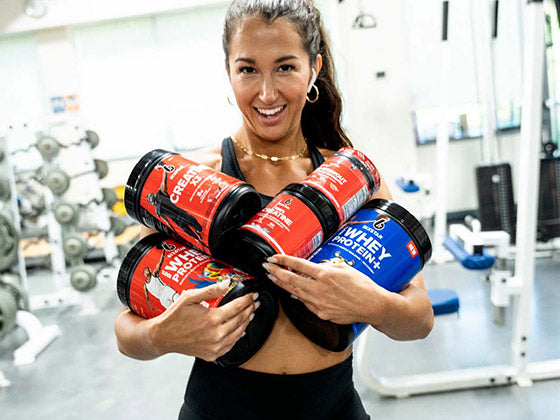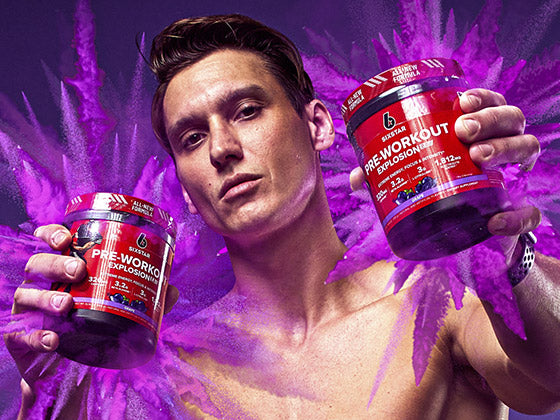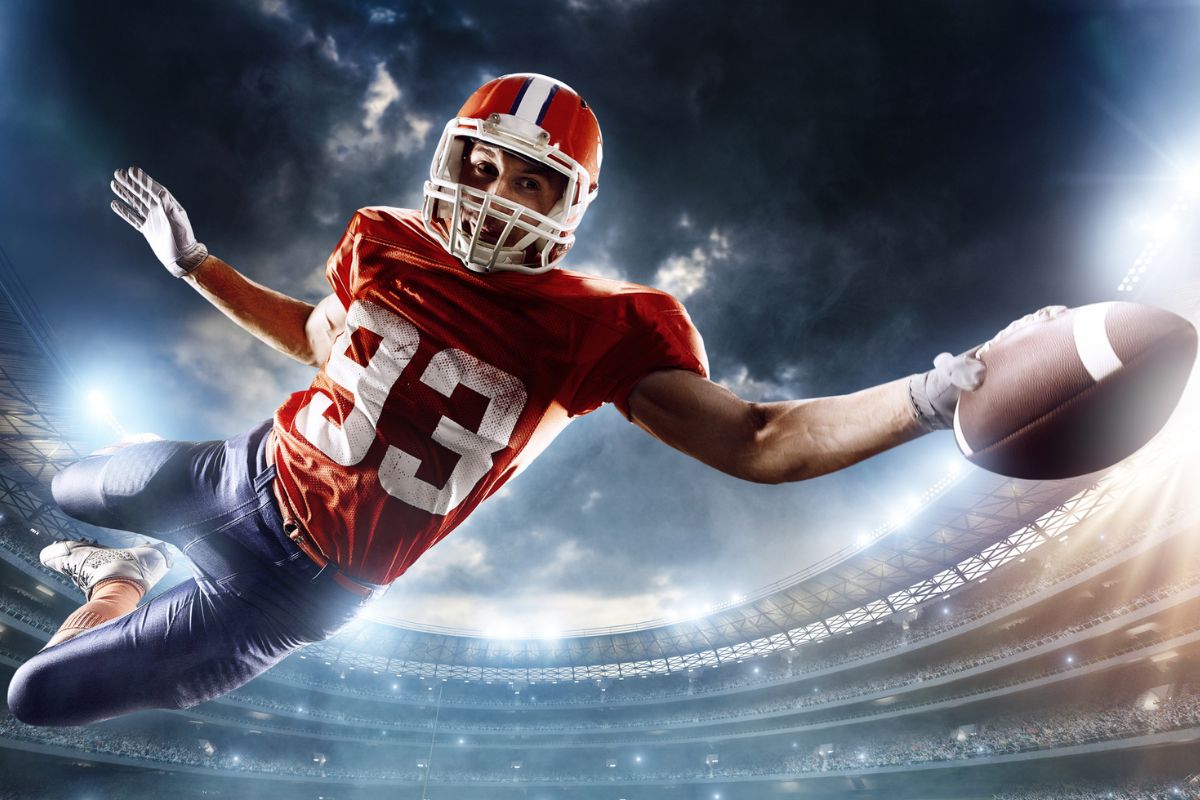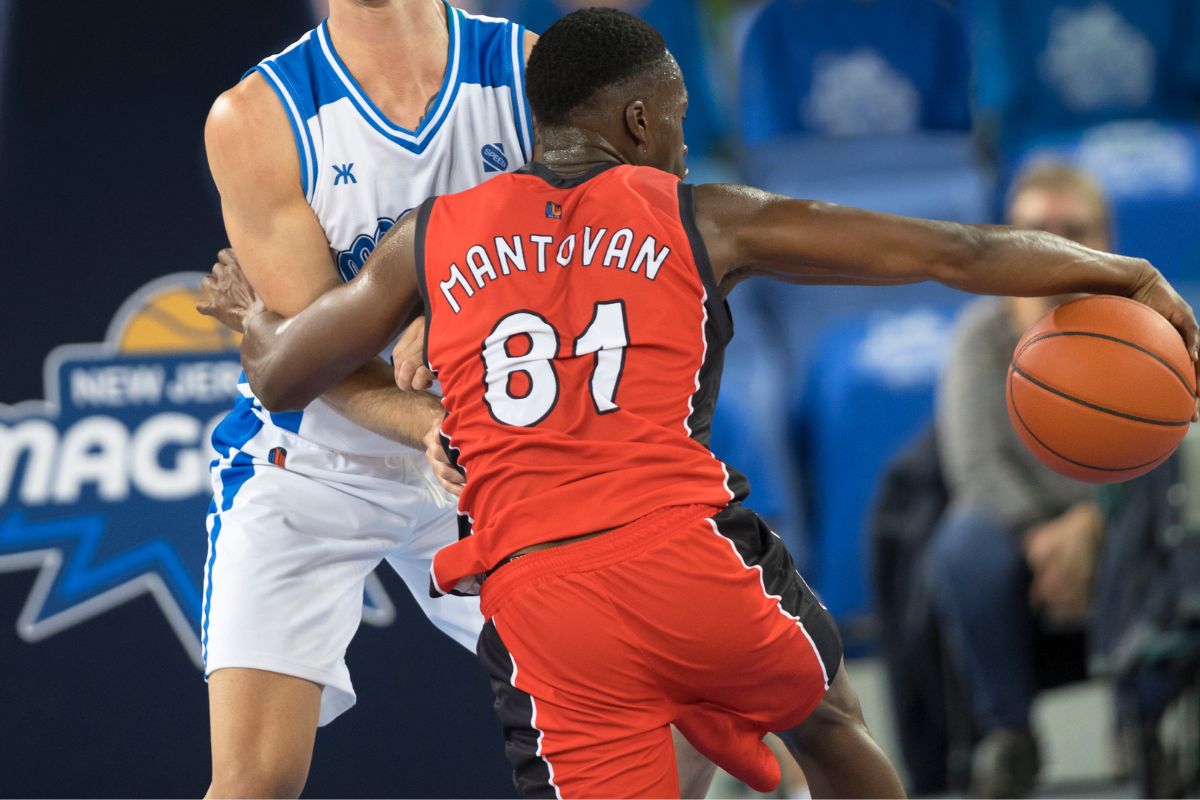Football is a high-intensity sport, and the demands on your body are immense. From explosive runs to bone-crushing tackles, your muscles and joints are put to the test.
Nutrition isn't just about looking good in your jersey; it's about making sure your body has the energy, strength, and resilience it needs to handle every play.
So, whether you're a rookie just getting started or a seasoned veteran dominating the field, nutrition plays an MVP role in your game.
Your body needs the right nutrients to sprint down the field, tackle opponents, and throw those touchdown passes. Without proper nutrition, you might just find yourself running out of gas midway through the fourth quarter.
This means you'll need a combination of carbs for quick energy, protein for muscle building and repair, and fats for long-term energy. And that's not even getting into the vitamins, minerals, and hydration needed to keep everything running smoothly.
Shop & Save on Protein Powder on Sale
In this blog, along with the diet for football players, you'll also grasp a better understanding of what to eat, when to eat, and how to eat. So, read till the end.
Macronutrient Breakdown for Football Players
When it comes to peak athletic performance, understanding the three primary macronutrients - carbohydrates, proteins, and fats - is essential. As an athlete, you need the right balance of these macros to perform at your best.
1. Carbohydrates for Quick-Action Energy
Carbohydrates are organic molecules found in foods like grains, fruits, vegetables, and dairy products. Carbs are converted into glucose in our bodies, which provides immediate energy. For high-intensity sports like football, this quick-burning energy is vital.
Not all carbs are created equal. Simple carbs, found in sugary foods and drinks, provide rapid energy but can lead to energy crashes. Complex carbs, like those in whole grains and legumes, release energy more slowly.
2. Proteins to Build and Repair the Body
Proteins consist of amino acids, the building blocks of our muscles and tissues. They're found in foods like meat, poultry, fish, eggs, dairy, beans, and lentils.
After an intense workout or game, muscles experience wear and tear and Proteins help repair these tears, leading to muscle growth and strengthening. While it's essential to have protein throughout the day, consuming it post-workout can help in muscle repair.
Shop & Save on Pre-Workout Supplements
3. Fats for Long-Lasting Energy
Fats are dense energy sources found in oils, butter, avocados, nuts, seeds, and fatty cuts of meat. While carbs fuel short, intense bursts of activity, fats provide energy for longer, lower-intensity efforts.
They're also essential for absorbing certain vitamins and cushioning vital organs. Unsaturated fats are heart-healthy and anti-inflammatory. Saturated fats should be consumed in moderation. Trans fats, often in processed foods, should be limited.
Hydration in Football
Football is not just a game of strategy and skill; it's a full-on physical battle. With every drop of sweat, not only do you lose water, but vital minerals known as electrolytes are also lost.
Dehydration can lead to muscle fatigue, reducing your explosive power and endurance. A well-hydrated muscle responds better and is less prone to injuries like strains or cramps. Adequate hydration ensures your brain functions are sharp, so you're always a step ahead of your opponent.
Football gear isn't exactly breezy, and combined with physical exertion, players can overheat quickly. Water helps regulate body temperature, ensuring you don't get too hot under the helmet.
Shop & Save on Hydration Supplements / Electrolytes
Focus on getting Electrolytes
Electrolytes, like sodium, potassium, and chloride, play a pivotal role in muscle function and maintaining fluid balance. Electrolytes aid in transmitting electric signals in the body.
Without them, muscles might cramp or not function properly. While water replenishes lost fluid, electrolytes help maintain the right balance of fluids inside and outside your cells.
Game Day Hydration Strategy
Pre-Game
Start hydrating the day before. On game day, aim to drink at least 16-20 ounces of water a few hours before kick-off, and another 8 ounces right before you step onto the field.
During the Game
Sip on the water during breaks. If you're sweating heavily, consider sports drinks that contain electrolytes to replenish those lost in sweat.
Post-Game
Rehydration doesn't stop when the whistle blows. Continue drinking water and consider beverages with added electrolytes to aid recovery.
Also Read:
Diet for Football Players
What you put in your body before you hit the field can make a significant difference in your energy, endurance, and focus.
Pre-Game Meal Strategy
Eat your main pre-game meal about 3-4 hours before kick-off. This allows your body adequate time to digest and convert that food into usable energy while ensuring you won't feel sluggish or heavy come game time.
Prioritize complex carbohydrates, include lean proteins, and don't forget healthy fats. On top of that, stay as hydrated as you can.
Pre-game Meal recommendation
- Brown rice or quinoa bowls with vegetables.
- Whole wheat pasta with a light tomato or olive oil-based sauce.
- Oatmeal topped with fruits (like bananas or berries) and a sprinkle of nuts or seeds.
- Sweet potatoes, either roasted or mashed.
- Whole grain bread or bagels with a thin spread of almond or peanut butter.
You can include Lean Proteins like;
- Grilled chicken or turkey breast.
- Baked or grilled fish like salmon or tilapia.
- Tofu or tempeh stir-fried with veggies.
- Lean beef cuts preferably grilled or roasted.
- Egg whites (omelet with veggies or hard-boiled).
Healthy Fats for you would be:
- Avocado slices (can be added to sandwiches or salads).
- A handful of nuts like almonds, walnuts, or cashews.
- Seeds like chia or flaxseed sprinkled on oatmeal or yogurt.
- Olive oil dressing on salads or drizzled over cooked veggies.
- Natural nut butter spread thinly on whole-grain bread.
Hydration needs:
- Drink at least 16-20 ounces of water with your meal. Consider a sports drink with electrolytes if pre-game temperatures are high or if you've had intense workouts leading up to the game.
Include Fruits and Veggies, such as,
- Steamed or roasted vegetables like broccoli, carrots, or green beans.
- Fresh fruit salad with a mix of berries, melon, and citrus.
- Spinach or mixed greens salad with a light dressing.
- Steamed asparagus or Brussels sprouts with a sprinkle of lemon juice.
Avoid these foods:
- Fatty, greasy, or fried foods.
- High-sugar foods and beverages.
- Excessive dairy, especially if intolerant.
- Spicy foods that might upset the stomach.
- Large amounts of caffeine.
Post-Game Recovery
The foods and drinks you consume after a game are pivotal in ensuring you bounce back stronger, faster, and ready for the next challenge. After giving it your all on the football field, your muscles are tired, and your energy stores or glycogen are depleted.
The right post-game nutrition accelerates muscle recovery, reduces fatigue, and prepares you for your next training session or game. Consume your post-game meal or snack within 30 minutes to 2 hours after the game.
Shop & Save on BCAAs
This period is when your body is most receptive to nutrients and will use them efficiently for recovery. Prioritize protein more as it helps with muscle repair while also including the right amount of carbohydrates and fats in your diet.
Post-game Meal Recommendations
Protein-Rich Foods:
- Grilled chicken or turkey slices on a whole grain wrap.
- Tuna or salmon salad with mixed greens.
- Quinoa salad sprinkled with beans or chickpeas.
- Greek yogurt smoothie blended with fruits.
- Whey or plant-based protein shake.
Carbohydrate Sources:
- Brown rice or whole grain pasta dishes.
- Sweet potato wedges, roasted or steamed.
- Fresh fruit salad – especially with bananas, berries, and oranges.
- Whole grain bread or rolls.
- Oatmeal with a drizzle of honey and chopped nuts.
Hydration & Electrolytes:
- Plenty of water throughout the post-game period.
- Electrolyte-infused sports drinks.
- Coconut water for a natural electrolyte boost.
- Watermelon or cucumber slices – both hydrating foods.
Healthy Fats:
- Avocado slices on sandwiches or in salads.
- A handful of mixed nuts or trail mix.
- Chia seed pudding is made with almond or coconut milk.
- Olive or flaxseed oil drizzled over salads.
- Nut butter spread on whole grain bread or mixed into smoothies.
Veggies for Added Nutrients
- Steamed or roasted vegetable medley (broccoli, carrots, bell peppers).
- Mixed green salad with colorful veggies and a light dressing.
- Spinach or kale sautéed in olive oil with garlic.
- Veggie stir-fry paired with lean protein sources.
Avoid these foods:
- Greasy, heavy, or overly fatty foods might slow down digestion.
- Sugary sodas or drinks can cause an energy crash.
- Excessive caffeine might interfere with sleep.
Best Supplements for Football Players
In the dynamic and demanding world of football, athletes are constantly seeking an edge—whether it's in training, nutrition, or recovery. Supplements are concentrated sources of nutrients that promise improved performance, quicker recovery, and better health.
Creatine
Creatine has been shown to improve short bursts of high-intensity athletic performance. It can increase muscle mass, strength, and power output—essential for those explosive plays on the football field. You should also consider the fact that not everyone responds to creatine supplementation in the same way so tune your dosage according to your needs.
Whey Protein
Whey protein helps in muscle recovery and growth, essential after those grueling training sessions and intense games. It's easily digestible and quickly absorbed.
Branched-Chain Amino Acids (BCAAs)
BCAAs (leucine, isoleucine, valine) can support muscle recovery and protein synthesis.
Omega-3 Fatty Acids
These essential fats, often sourced from fish oil, can reduce inflammation, support brain health, and potentially improve recovery times.
Vitamin D
It is critical for bone health, immune function, and inflammation control. Given the demanding physical nature of football, maintaining strong bones and efficient recovery is vital.
Electrolyte Tablets and Powders
They help replenish lost minerals during sweating and can support hydration, especially during intense summer training or extended games.
Over to You
Fueling your body correctly is not just a lifestyle choice; it's an essential strategy for achieving success on the football field. Give your body the nourishment it needs, focus on balanced nutrition, and channel your energy towards becoming the best athlete you can be.
Buy Athletic Supplements from SixStar
Read Our Top Blogs:
- When to Take to Take BCAA? Maximizing Your Workouts, Enhancing Your Health
- How Does Pre-Workout Work?
- Testosterone and How it Effects Athletic Performance
- Fitness & Diet For Offensive & Defensive Linemen




